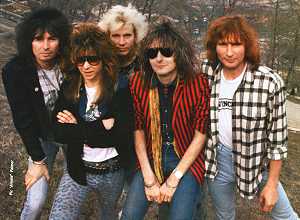

Phil Mogg was hanging around Los Angeles. Pete Way was doing his thing in Waysted. Andy Parker was working with a band named Scarlett Fox. Neil Carter was probably in guitar great Gary Moore's projects. Michael Schenker was making electric guitar fans dizzy with his masterpiece instrumental "Captain Nemo." This was somewhere between 1983 and 1984.
Mogg just prior to 1985 felt the need to re-enter the rock and roll ring. He talked to heavy metal record mogul Mike Varney and was provided two tapes of two cutting-edge guitarists: one of Yngwie Malmsteen, one of "Atomik" Tommy M. Phil took the latter and the rest was (short) history. They collected bassist Paul Gray, drummer Jim Simpson (after Robbie France quit) and...re-recruited Paul Raymond from his past battles with Waysted, MSG and other personal projects to fulfill the keyboards/guitar duties. Needless to say, Michael Schenker once wrote a letter to the British rock magazine Kerrang to protest this resurrection signing it with his name as "an angry UFO fan." (Why Schenker worried about Mogg and UFO when his own MSG program had its own pressing matters can be said to be a mystery.) Pete Way simply shrugged and said "Waysted pisses all over UFO" in that same periodical in a different issue.
Misdemeanor (1986) was recorded in Holland with Nick Tauber producing. There were two mixes available for this opus: a more polished one for the American market and a bit rougher-edged one for Europe. The collection is somewhat of a drastic departure from the Chapman/Schenker eras, though many critics may disagree. Aside from a flair for melody, Atomik Tommy McClendon has a style that sounds very L.A. flashy in a sort of mature way. He does not possess the sense of Eurometal moodiness more present in Michael Schenker and (to a lesser extent) Paul Chapman's styles. The songs written by McClendon/Mogg reflect a different sense of maturity and excitement. The modern late 80s vibe of a tune like "Heaven's Gate" makes one have visions of taking a cruise in a car and driving down any modern urban thoroughfare while the city nightlights glitter. The same could be said for supurb constructs like "Night Run" and "This Time." Personally, I don't like to really compare the Atomic Tommy era with the Schenker or Chapman eras. It was different and refreshing. The pulsating song in B minor, "Meanstreets", reflects state of the art hard rock at its finest. True, there were other UFO fans who did not like the AOR flair of this "new" UFO. If Misdemeanor had the guitars brought out more in the mix, it would have been the perfect album, but it's a classic to me nonetheless.


UFO seemed to run their course again as nothing was heard from Phil Mogg other than rock magazine reports saying Atomik Tommy left the group. By 1987, Pete Way resurfaced, presumably after Waysted dissolved, and re-joined his good friend Mogg. They stocked their new line-up with Lawrence Archer (of Grand Slam) on guitar and Clive Edwards on drums. They released High Stakes and Dangerous Men (1991). Every now and again, every good group will release a total dud and this album was a dud. Some fans loved the disc but the lack of minor key songs was not to my preference. The collection starts off with a bang with "Borderline" (one of the best UFO songs ever) with its serious pulsating verses, pounding rhythm work and nasty guitar solo. But the songs after it all sound the same and rather blues-based. "Back Door Man" is the only other distinguished cut. The songs just generally lack fire. Archer is an excellent Malmsteen-like shredder on his Jackson guitar but his generic songwriting style did not mesh well at all with Mogg. The live Lights Out in Tokyo (1992) is surprisingly good though. Archer did a credible job doing his renditions of Schenker era classics like "Lights Out" and "Love to Love."



Generally, it seemed though that Phil Mogg was going to go down the drain washed up. An album like High Stakes and Dangerous Men seemed to be the foil that would be the killer. So it seemed.